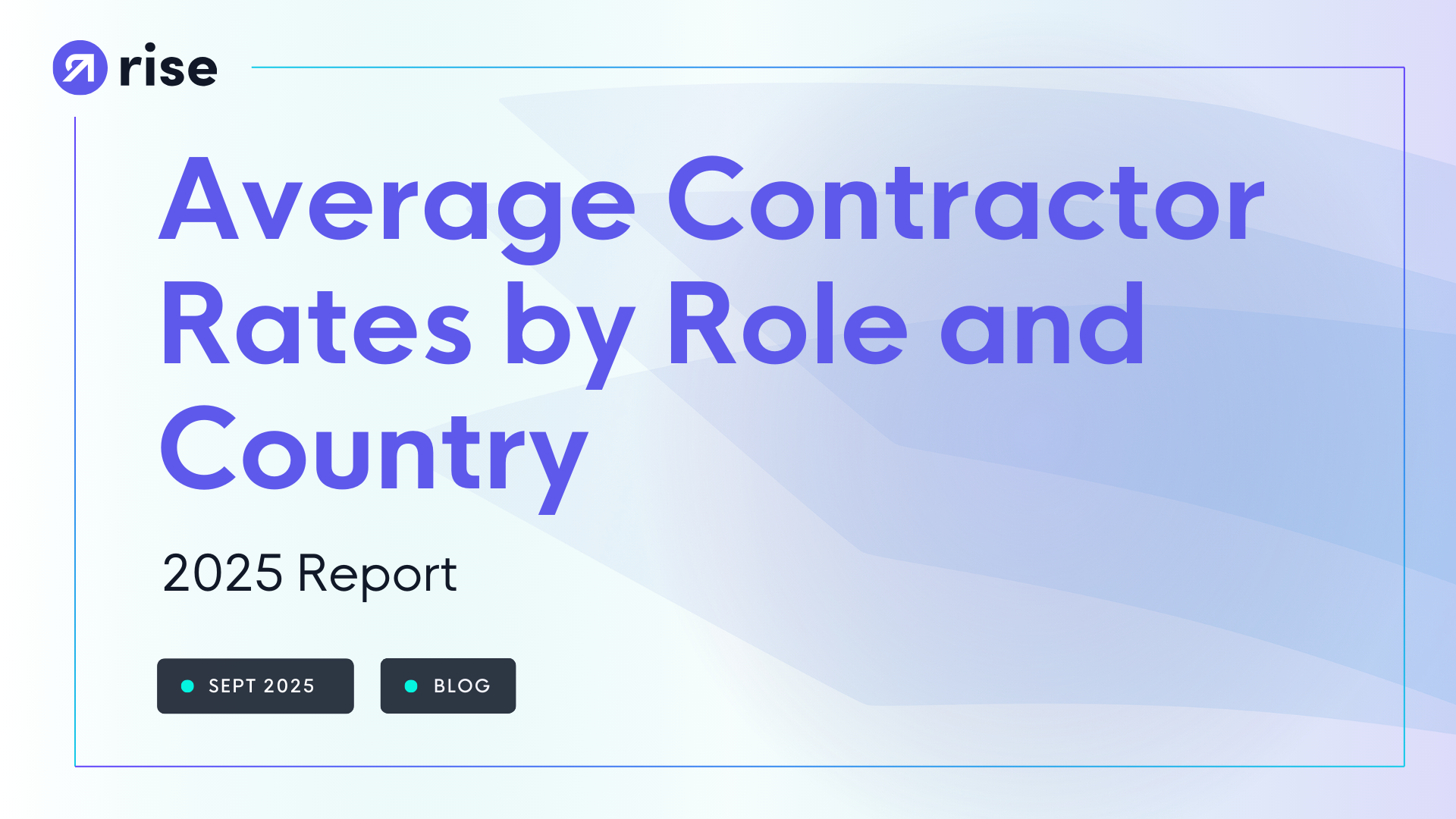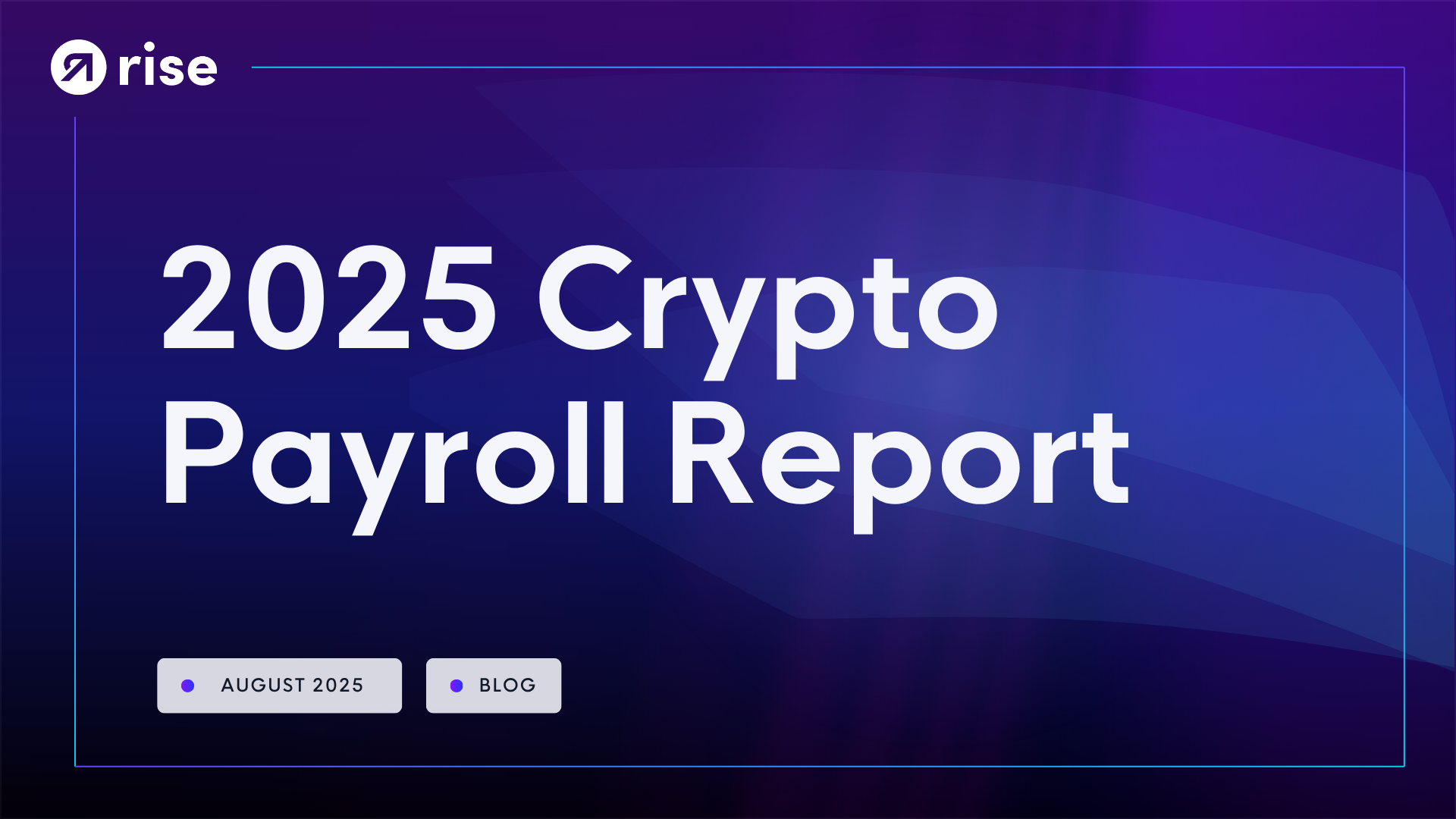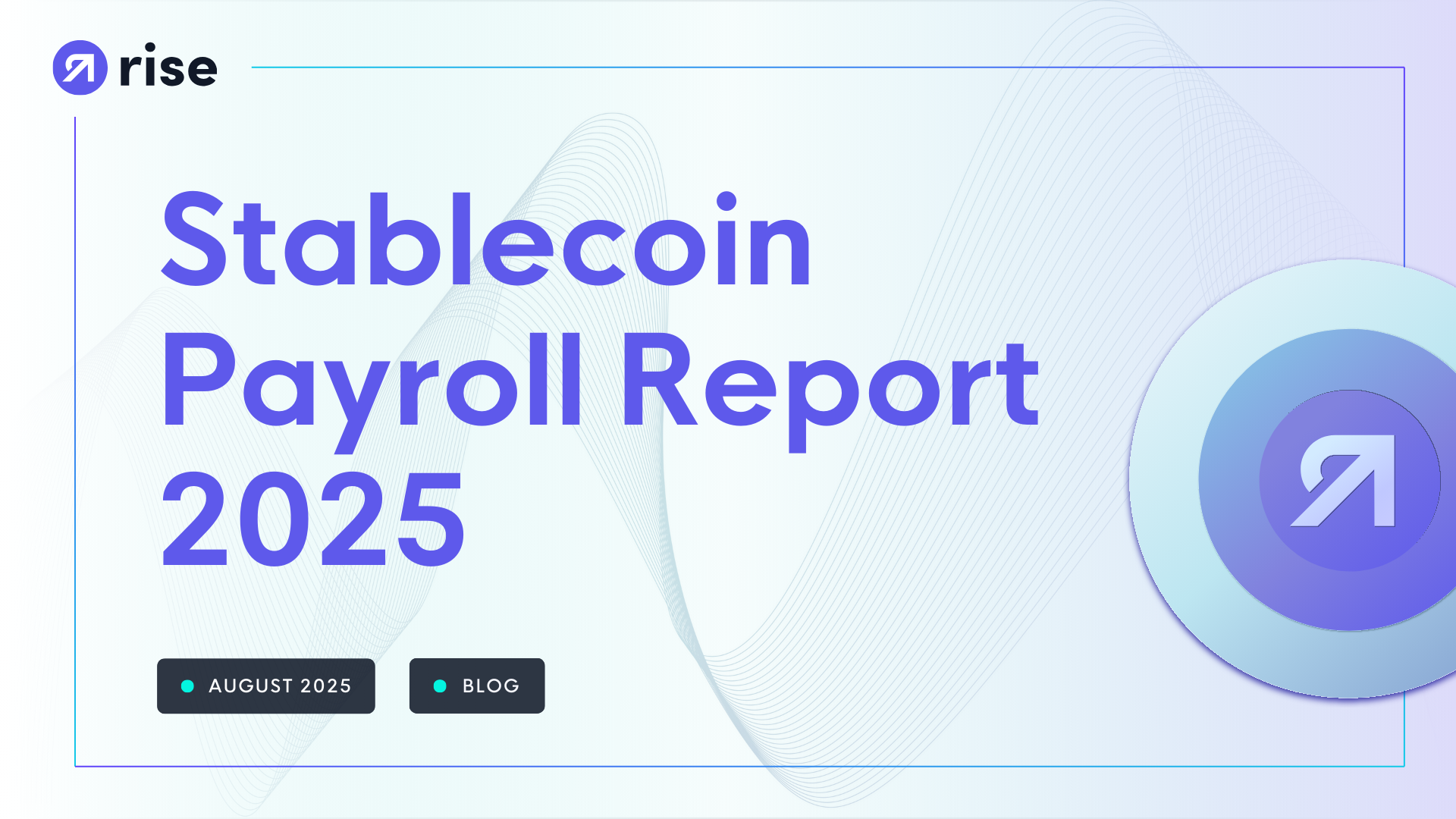The global contractor economy has reached unprecedented heights in 2026, with businesses increasingly relying on flexible talent to drive innovation and growth.
When companies navigate this complex landscape, understanding contractor rates across different roles and regions becomes essential for strategic workforce planning.
At Rise, we've facilitated over $800 million in contractor payments across 190 countries, giving us unique insights into how rates vary and why these differences matter for your business.
Key Takeaways
- Geographic arbitrage creates 5-10x rate differences because location still matters: When AI specialists in the US earn $130/hour at director level, equally skilled Eastern European contractors charge $25-$50/hour for the same expertise
- If you specialize in AI/ML, then expect 40-60% higher rates: When machine learning and AI contractors command premium rates across all markets, generalist developers face increasing commoditization
- How payment methods affect your bottom line: When contractors accept cryptocurrency payments, they often negotiate 5-10% lower rates due to faster processing and reduced transaction fees
- Why compliance costs matter more than hourly rates: If companies use Agent of Record services, they pay more upfront but save significantly on potential misclassification penalties that can reach $100,000+
- When industry expertise trumps technical skills: If you work in finance or healthcare, then expect to pay 20-30% premiums due to regulatory complexity and domain knowledge requirements
The Current State of Global Contractor Rates: Understanding Why Rates Vary So Dramatically
The contractor market in 2026 presents a paradox.
While remote work theoretically levels the playing field, dramatic rate disparities persist.
The average global freelancer rate of $101.50/hour, masks variations that create opportunities for strategic businesses (Clockify, 2025).
Understanding Rate Variations by Industry: Why Your Sector Determines What You Pay
Premium industries command top rates due to specialized requirements.
Banking and finance lead at $110.88/hour, because regulatory complexity demands expertise.
Energy ($108.82/hour), healthcare/pharma ($109.83/hour), and insurance sectors maintain similar premiums, when mistakes cost millions, expertise commands premiums.
Traditional industries increasingly compete for digital talent.
Automotive contractors earn $106.74/hour, while Transportation and Logistics follow at $106.73/hour.
Mid-tier sectors like Retail ($104.66/hour), Consulting ($102.60/hour), and Mechanical Engineering ($100.49/hour) reflect how digital transformation drives demand across all industries.
Surprisingly, IT/Software contractors average just $93/hour, market saturation reduces premiums when skills commoditize.
Education ($78.7/hour) and Tourism ($80.8/hour) occupy the lower tier, where budget constraints limit rates.
United States: The Premium Market Where Specialization Pays
When analyzing the US market, we find it continues to command the highest contractor rates globally, but the landscape reveals striking variations across roles, experience levels, and specializations.
If you're hiring in the US, then understanding these nuances determines whether you overpay or get value.
The AI and Machine Learning Gold Rush: How Specialization Creates Premium Rates
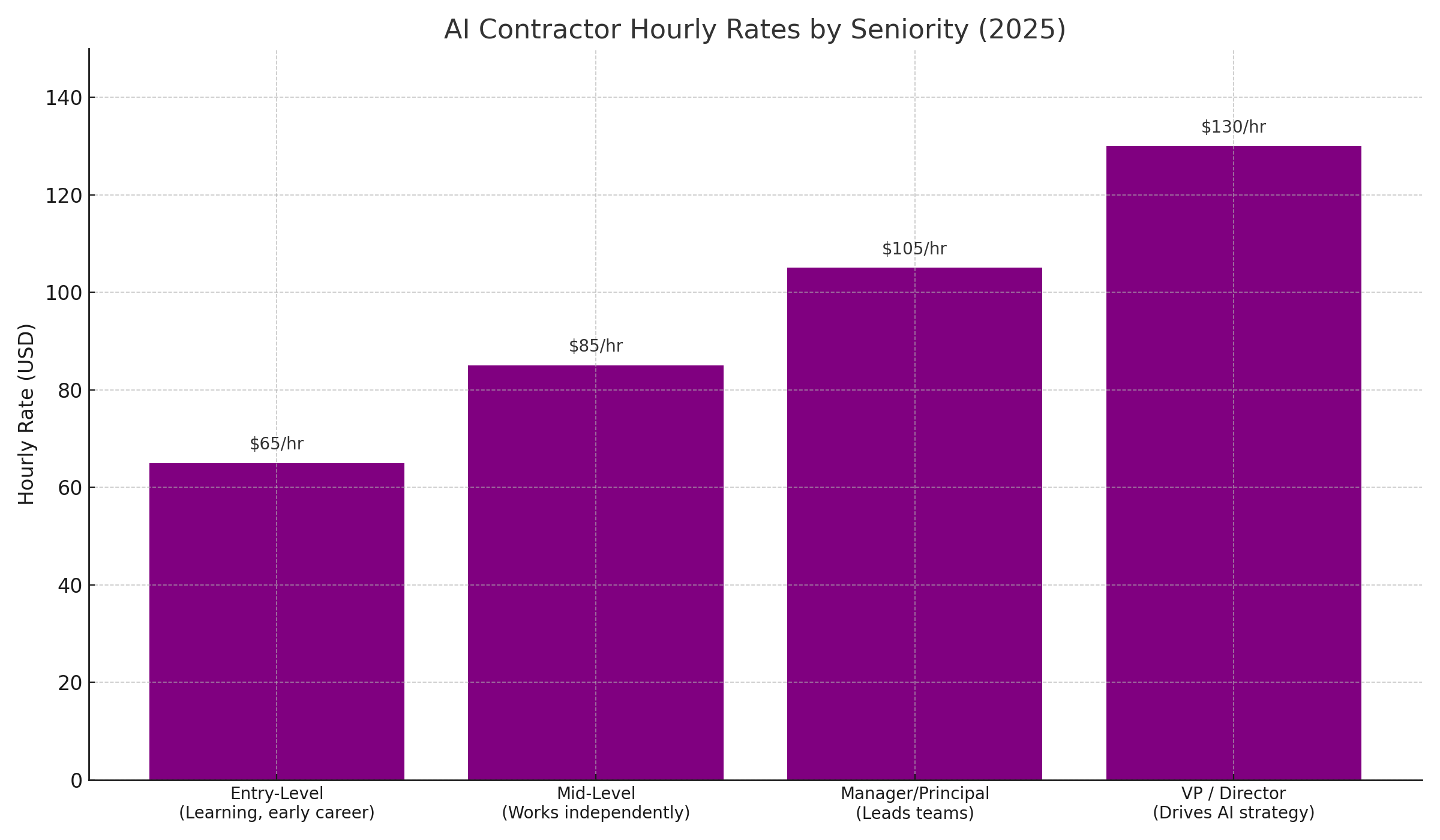
The most dramatic story in US contractor rates centers on AI and machine learning specialists.
When we examine the progression from entry to executive level, consistent patterns emerge across specializations that help predict costs.
1. If you need Artificial Intelligence contractors, then expect clear rate progression:
- Market entry professionals earn $65/hour because they're still learning.
- Mid-level practitioners command $85/hour when they can work independently.
- Managers and principals reach $105/hour because they lead teams.
- VP/Director level professionals top out at $130/hour when they drive strategy (Digital Republic Talent, 2025).
2. Machine Learning specialists command slight premiums:
Entry-level matches AI at $65/hour, but mid-level jumps to $85/hour when specialized expertise matters.
Managers earn $105/hour, maintaining the $130/hour ceiling for directors because market dynamics cap even premium roles.
3. When hiring Deep Learning contractors, expect more modest rates despite specialized work:
$65/hour at entry because fundamentals remain similar, $75/hour at mid-level (notably lower than general ML) when focus narrows, $95/hour for managers, and $125/hour for directors.
This unexpected pattern reflects how narrow specialization can limit market demand.
4. Computer Vision specialists demonstrate interesting variations:
They maintain the standard $65/hour entry rate when starting out, jump to $85/hour at mid-level when practical skills develop, but cap at $95/hour for managers and $120/hour for directors because the market remains niche.
5. Natural Language Processing (NLP) contractors command entry-level premiums:
Starting at $70/hour (versus $65 for other AI fields) because LLM boom drives demand, rising to $85/hour mid-level when ChatGPT skills matter, $100/hour for managers who understand business applications, and $120/hour for directors who drive AI strategy.
6. If you need MLOps specialists, then expect to pay for the intersection of ML and operations:
$65/hour entry because basics transfer, $80/hour mid-level when infrastructure expertise develops, $105/hour for managers who bridge teams, and $125/hour for directors because few understand both domains.
Traditional IT and Development Roles: Why Generalists Face Pricing Pressure
When examining traditional IT roles beyond the AI market, we see steady but lower rates.
- General IT consulting ranges from $100-$175/hour (Kodytechnolab), with significant variations based on specialization and client industry.
When obtaining quotes for IT contractors, companies often discover that specialized expertise commands substantial premiums over generalist skills.
- Software developers average just $31.70/hour (Clockify), which strikes many as surprisingly low.
This reflects how commoditization of general development skills drives rates down when supply exceeds demand.
- DevOps engineers represent a bright spot in traditional IT.
When they possess Kubernetes skills, they earn $120,000-$180,000 annually at mid-level, rising to $250,000 at senior levels.
If you convert to hourly contractor rates, this translates to approximately $60-$120/hour because cloud expertise remains scarce.
Business and Support Roles: How Non-Technical Contractors Price Their Services
The contractor economy extends well beyond technical roles, and understanding these rates helps build complete teams.
- Project managers average $29.34/hour because coordination skills commoditize.
- Content writers earn $22.28/hour when quality writing abounds, and accountants command $23.80/hour because automation pressures traditional roles.
If you need graphic designers in the US, then expect to pay $34.51/hour, representing a creative premium over general business roles.
General contractors in construction average $42/hour or $87,561 annually (Fieldwire, 2025), operating in an entirely different ecosystem where physical presence and materials handling matter more than digital skills.
United Kingdom: The Daily Rate Culture and What It Means for Your Budget
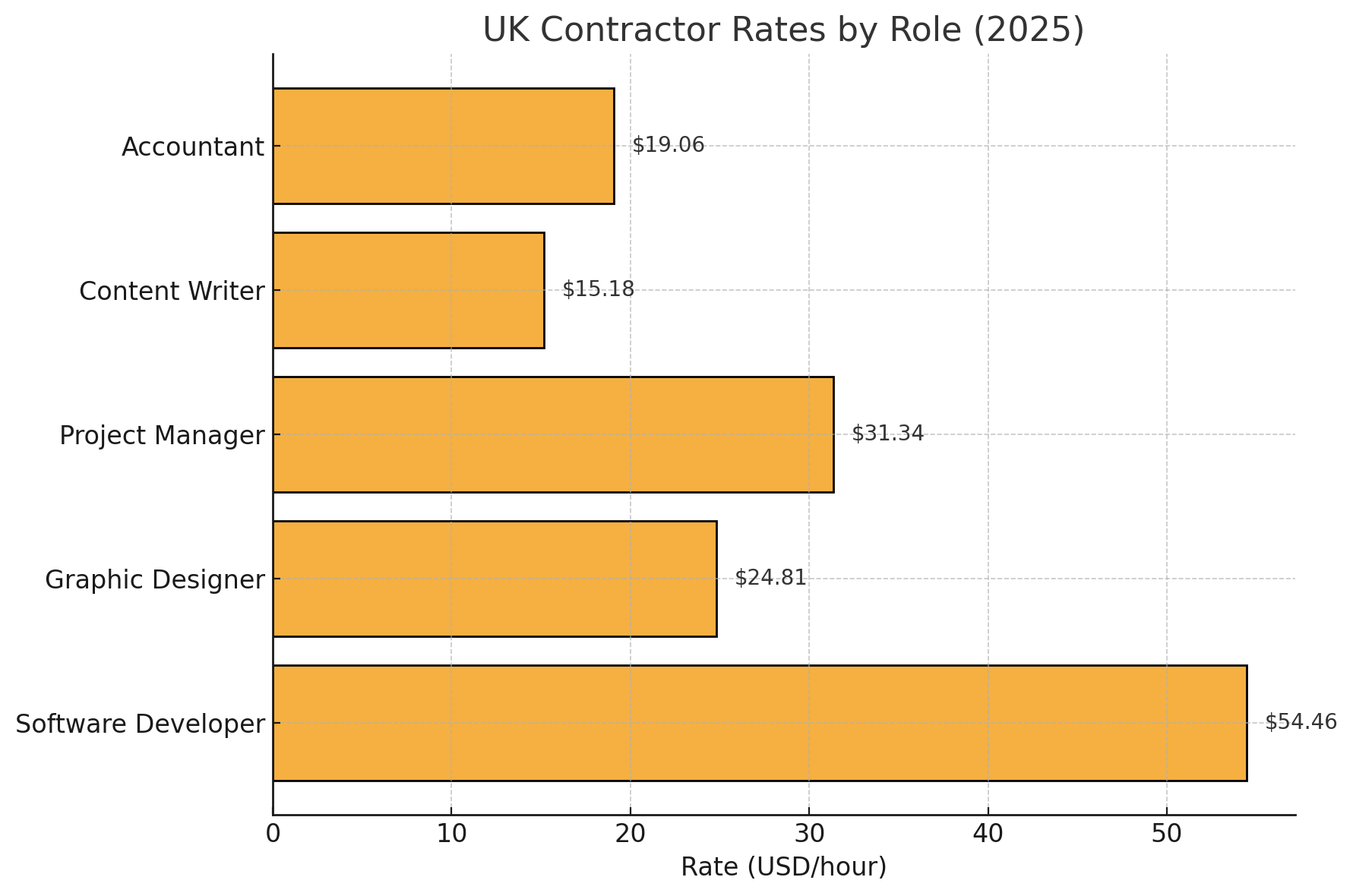
When working with UK contractors, understanding daily rate culture becomes essential.
The UK market's preference for daily rates creates a unique dynamic in global contractor payments, with fascinating implications for both contractors and clients.
Technology Daily Rates: Why UK Contractors Think in Days, Not Hours
UK technology contractors have established a clear hierarchy based on expertise and seniority that helps predict costs:
1. Data Science contractors show clear progression:
£350/day at entry level when building foundations, £450/day at mid-level when independence develops, £750/day for managers and principals who lead projects, and £1,100/day for VP and director roles because strategy commands premiums.
2. If you need Machine Learning specialists, then prepare for consistent premiums:
£400/day entry (14% above data science) because specialization starts early, £650/day mid-level (44% premium) when expertise deepens, £850/day for managers who bridge technical and business, and £1,200/day for directors because few combine both skills (Digital Republic Talent).
The Full-Time vs. Contractor Divide: Understanding Why Contractors Cost More
When comparing UK employment types, dramatic differences emerge.
Full-time developers earn $25-$38/hour, while contractors command $64-$108/hour (Index.dev).
This 2.5-3x multiplier exceeds even US market premiums because several factors compound:
Why contractors charge more than employees:
- Flexibility premium: Companies pay for scaling ability
- Expertise access: Contractors bring specialized project skills
- Reduced overhead: No benefits or long-term commitments
- Risk transfer: Contractors assume financial uncertainty and equipment expenses
Beyond technology, UK contractor rates reveal interesting patterns that inform hiring decisions:
- Software developers: $54.46/hour (£43.04) when specialized skills matter
- Graphic designers: $24.81/hour (£20.05) because creative markets saturate
- Project managers: $31.34/hour (£24.77) when coordination commoditizes
- Content writers: $15.18/hour (£12) because global competition pressures rates
- Accountants: $19.06/hour (£15.06) when automation reduces value
Continental Europe: A Study in Contrasts Where Geography Determines Rates
When examining Europe's contractor market, we find perhaps the widest internal variations of any region.
Rates vary by 400% or more for identical roles across different countries because economic development differs dramatically.
Western Europe: Premium Markets with Nuances That Matter
Germany stands as Europe's largest economy with corresponding contractor rates that reflect economic strength:
- Full-time developers: $20-$37/hour when employment protections add cost
- Contract developers: $64-$128/hour because flexibility commands premiums
- Graphic designers: $29.86/hour (€28.50) when creative skills combine with reliability
The 3-4x contractor multiplier in Germany exceeds even UK premiums because strong labor protections make permanent employment expensive and inflexible.
If you hire in France, expect more modest contractor premiums:
- Full-time developers: $14-$32/hour because salaries stay lower
- Contract developers: $37-$75/hour when flexibility matters less
- Graphic designers: $36.27/hour (€35) because creative culture values design
Netherlands strikes a balance with competitive contractor rates:
- Full-time developers: $16-$35/hour when work-life balance matters
- Contract developers: $80-$107/hour because English fluency adds value
Nordic Countries maintain premium positioning because high living standards drive costs:
- Sweden: Contractors earn $80-$140/hour versus $29-$86/hour for full-time developers when taxation favors contracting
- Finland: Similar pattern with contractors at $80-$140/hour against $28-$84/hour full-time because Nordic model creates disparities
Southern Europe offers more affordable options when budgets constrain:
- Spain: Contractors $37-$75/hour versus $16-$27/hour full-time because unemployment drives competition
- Italy: Contractors $37-$77/hour versus $16-$32/hour full-time when economic challenges pressure rates, 2026
Eastern Europe: The Value Proposition Where Quality Meets Affordability

When companies seek high-quality technical talent at competitive rates, Eastern Europe delivers compelling value.
Overall IT consulting in the region ranges from $25-$50/hour (Kodytechnolab), representing 70-80% savings versus Western rates while maintaining quality.
Poland leads in volume and established infrastructure:
- Full-time developers: $25-$40/hour because skills match Western standards
- Contract developers: $50-$70/hour when English fluency enables collaboration
Ukraine maintains competitiveness despite ongoing challenges:
- Full-time developers: $20-$35/hour because technical education excels
- Contract developers: $45-$65/hour when time zones align with Europe
If considering Romania, expect competitive rates:
- Full-time developers: $25-$45/hour when EU membership adds stability
- Contract developers: $45-$65/hour because growing tech sector attracts talent
Czech Republic shows interesting variability that reflects Prague's emergence:
- Full-time developers: $27-$36/hour because cost of living rises
- Contract developers: $32-$100/hour when international companies pay premiums
Hungary presents dramatic contractor premiums worth understanding:
- Full-time developers: $9-$11/hour because local wages stay low
- Contract developers: $23-$88/hour when international clients pay globally
Bulgaria offers perhaps the widest range in Europe:
- Full-time developers: $30/hour average when skills vary widely
- Contract developers: $15-$110+/hour because quality spectrum broadens
Global Markets Comparison: A Comprehensive View of How Regions Stack Up
When companies evaluate global contractor options, understanding how different markets compare helps make informed decisions about where to source talent and how contractors can position themselves competitively.
The Premium Markets: Where High Costs Reflect High Value
United States remains the global leader in contractor rates, with specialized roles commanding exceptional premiums.
Beyond the $65-$130/hour range for AI specialists, general freelancers average $48/hour, still well above global averages because purchasing power matters.
Canada occupies an interesting middle ground between US and global rates:
- IT Consulting: $100-$130/hour when competing with US for talent
- Software developers: $20.18/hour (C$28.84) because general skills commoditize
- Project managers: $25.89/hour (C$36.73) when coordination becomes routine
- Content writers: $18.11/hour (C$25.70) because global competition pressures
- Accountants: $18.09/hour (C$25.85) when automation threatens traditional roles
Australia maintains Pacific premium rates because isolated market protects pricing:
- IT Consulting: $80-$120/hour when timezone alignment with Asia matters
- Graphic designers: $30.98/hour (AU$49.43) because local market stays strong
The Value Markets: How Emerging Economies Compete on Price
Asia presents dramatic variations within the region that create opportunities:
- General IT consulting: $20-$40/hour across the region
- India specifically: $20-$30/hour for IT consulting when volume meets quality
- India graphic designers: $3.39/hour (₹296.61) because local rates prevail
- Singapore graphic designers: $18.79/hour (S$25.43) when developed economy shows
The contrast between India and Singapore illustrates how dramatically rates vary even within Asia.
When Indian DevOps engineers with Kubernetes skills earn ₹1,800,000-₹7,000,000 annually, this translates to roughly $10-$40/hour, competitive globally but representing top-tier local compensation.
Latin America has emerged as compelling nearshore option because time zones align:
- IT Consulting: $25-$50/hour when cultural fit combines with value
This positions Latin America competitively with Eastern Europe while offering time zone advantages for North American clients who need real-time collaboration.
Emerging and Specialized Markets: Where Opportunities Hide
Middle East shows interesting disparities that reflect economic structure:
- UAE graphic designers: $6.92/hour (AED51.9) when expatriate labor dominates
This surprisingly low rate for the UAE reflects how large expatriate workforce from lower-cost countries drives down average rates.
Africa presents unique opportunities when companies look beyond stereotypes:
- Kenya graphic designers: $2.60/hour (KSh336.50) because local currency weakens
However, Kenya's professional services tell different story when viewed through project percentages:
- Architects: 6% of project value when expertise matters
- Structural Engineers: 3.5% because specialization pays
- Quantity Surveyors: 3.5% when accuracy saves money
- Project Managers: 3% because coordination has value
- Interior Designers: 2% when aesthetics sell
- Services Engineers (MEP): 2% because systems complexity matters (X)
Contractor Rate Comparison: Key Markets at a Glance
When evaluating global options, clear comparison helps identify opportunities quickly.
Here's how major markets compare for common roles:
AI/ML Specialists: The Premium Technology Role
- United States: $65-$130/hour leads globally
- United Kingdom: £400-£1,200/day (approximately $50-$150/hour)
- Germany: $64-$128/hour matches US rates
- Eastern Europe: $25-$50/hour offers 70% savings
- India: $20-$40/hour when quality varies
- Latin America: $25-$50/hour with timezone advantages
Software Developers: The Backbone of Tech
- United States: $31.70/hour average surprises many
- United Kingdom: $54.46/hour exceeds US rates
- Germany: $64-$128/hour for contractors
- Eastern Europe: $45-$65/hour balances cost and quality
- India: $20-$30/hour when volume matters
- Latin America: $25-$50/hour nearshore option
Project Managers: Coordination Across Borders
- United States: $29.34/hour when commoditized
- United Kingdom: $31.34/hour similar to US
- Germany: $50-$100/hour surprisingly high
- Eastern Europe: $30-$60/hour reasonable middle ground
- India: $15-$30/hour budget option
- Latin America: $20-$40/hour cultural alignment
Graphic Designers: Creative Talent Worldwide
- United States: $34.51/hour creative premium
- United Kingdom: $24.81/hour below US rates
- Germany: $29.86/hour middle position
- Eastern Europe: $20-$40/hour quality varies
- India: $3.39/hour extreme value
- Latin America: $15-$30/hour growing market
IT Consultants: Strategic Technology Partners
- United States: $100-$175/hour premium expertise
- United Kingdom: $80-$150/hour competitive rates
- Germany: $100-$150/hour matches premium markets
- Eastern Europe: $25-$50/hour exceptional value
- India: $20-$30/hour volume play
- Latin America: $25-$50/hour timezone alignment
Key insights from this comparison:
- If you need specialized AI/ML talent, then US rates command premiums but Eastern Europe offers 70% savings
- When comparing software developers, UK rates exceed US because daily rate culture inflates
- If project management matters, then Germany surprisingly exceeds US rates
- When creative work drives value, US maintains premiums while India offers 90% savings
- If consulting expertise matters, then Western markets converge while emerging markets offer value
Understanding Contractor Categories: How Experience Levels Drive Rates
When hiring contractors globally, understanding experience categories helps predict rates and set expectations.
The global contractor market operates on well-defined experience tiers, each commanding different premiums.
Experience-Based Rate Progression: Why Seniority Commands Premiums
- If hiring Fledgling Consultants (0-2 years), then expect to pay $25-$50/hour globally.
These entry-level contractors often work under supervision and handle routine tasks because experience limits independence.
- When contractors reach Mid-Level (2-5 years), rates jump dramatically to $50-$120/hour.
This 100% increase reflects how independent work capability transforms value delivery.
- Senior Consultants (5+ years) command premium rates of $120-$300+/hour.
At this level, contractors bring strategic value and often lead teams because experience enables leadership.
- If you need Freelance Consultants with 10+ years, expect similar ranges of $100-$300/hour, but often these specialists focus on niche areas or executive advisory because depth beats breadth.
- Outsource IT Consultants from lower-cost regions charge $25-$75/hour, offering cost-effective alternatives when routine work dominates needs.
Pricing Models and Their Impact: How Structure Affects Rates
Different pricing models significantly affect effective hourly rates, and understanding these helps optimize costs:
Hourly Rate Model shows clear progressions that reflect market dynamics:
- Junior Consultants: $50-$100/hour when learning on the job
- Mid-level Consultants: $100-$150/hour because independence has value
- Senior Experts: $150-$300/hour when expertise drives outcomes (Kodytechnolab)
These direct hourly rates typically apply when project scope remains uncertain or duration stays short.
International Organizations: How Global Standards Provide Benchmarks
When evaluating contractor rates, international organizations provide valuable benchmarks.
The UN system maintains standardized contractor rates that reflect global market conditions while attempting fairness:
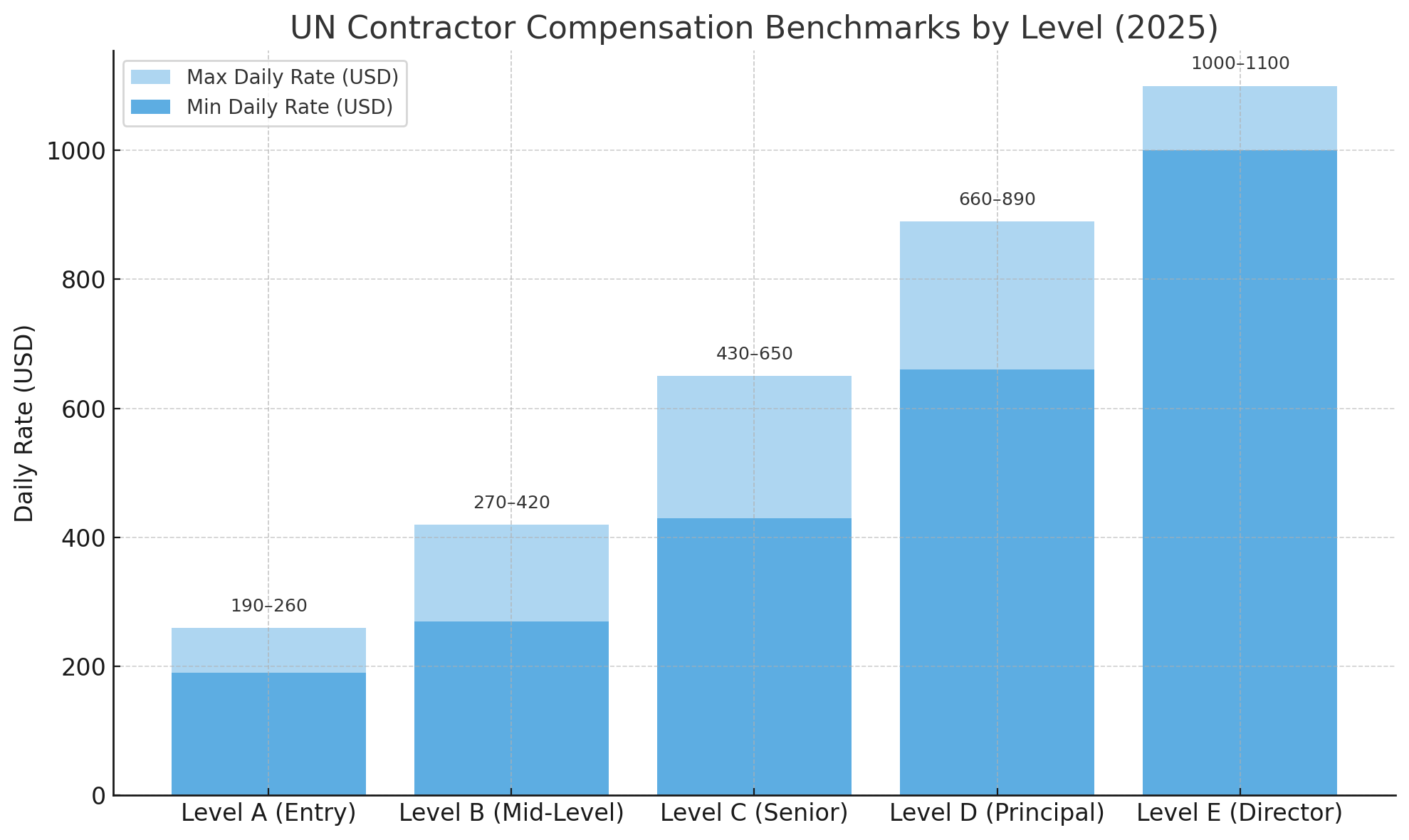
- Level A (Entry) contractors earn: $190-$260/day or $3,956-$5,492/month because global standards set floors (UN Policy)
- Level B (Mid-level) professionals command: $270-$420/day or $5,140-$8,727/month when experience adds value
- Level C (Senior) experts receive: $430-$650/day or $8,095-$12,399/month because expertise drives impact
- Level D (Principal) consultants earn: $660-$890/day or $11,491-$15,503/month when leadership matters
- Level E (Director) positions command: $1,000-$1,100/day or $16,090-$17,719/month because strategy has premium value
These standardized rates demonstrate how organizations attempt to balance global equity with local market conditions, a challenge every international company faces.
Industry-Specific Deep Dive: Why Your Sector Determines What You Pay
When hiring contractors, your industry matters as much as geography.
Specific industries show distinct contractor rate patterns that reflect unique requirements and economics.
Financial Services: The Complexity Premium That Reflects Risk
If you operate in finance, then expect to pay top dollar.
Finance and Banking IT Consultants command $120-$250+/hour globally.
This premium reflects several factors that compound costs:
- Regulatory compliance expertise (Basel III, MiFID II, Dodd-Frank) because mistakes cost millions
- Real-time system requirements when milliseconds matter for trading
- Security clearance needs because trust has value
- Domain-specific knowledge in trading, risk, or compliance when generalists can't deliver
Healthcare: Where Regulation Meets Innovation
Healthcare IT Consultants earn $100-$200+/hour.
The premium stems from factors unique to healthcare:
- HIPAA and international healthcare compliance because violations devastate
- Life-critical system requirements when downtime kills
- Integration with legacy medical systems because hospitals can't rebuild
- Emerging technologies like telemedicine and AI diagnostics when innovation saves lives
Technology and Software Development: The Commoditization Challenge
Pure technology consulting shows more moderate rates at $80-$150+/hour.
The lower premium (relative to finance and healthcare) reflects how market saturation and global competition pressure rates when barriers to entry fall.
Telecommunications: Infrastructure Complexity Commands Premiums
Telecommunications IT Consultants command $100-$180+/hour, driven by factors that create scarcity:
- 5G implementation expertise because new technology pays
- Network architecture complexity when scale challenges
- Regulatory compliance across multiple jurisdictions because governments regulate
- Critical infrastructure requirements when society depends on connectivity
Retail and E-commerce: Digital Transformation Drives Demand
Retail and E-commerce IT Consultants charge $70-$120/hour, reflecting sector focus on:
- Customer experience optimization because experience sells
- Omnichannel integration when customers expect seamlessness
- Real-time inventory management because stockouts cost sales
- Personalization and AI implementation when relevance drives revenue
The Role-Based Rate Hierarchy: Understanding How Skills Stack Up
When examining specific roles across industries, clear hierarchies emerge that help predict costs and value:
Technical Writing and Content: Where Global Competition Pressures Rates
The content creation market shows interesting stratification based on skill complexity:
- Content Writing freelancers globally: $26/hour when basic writing commoditizes
- Translation services: $19/hour because AI threatens human translation
- Administrative support: $13/hour when tasks routinize
Technical Roles: How Specialization Protects Rates
Programming freelancers globally average $28/hour, while Web and Graphic Design professionals earn $22/hour.
These relatively low global averages reflect how inclusion of lower-cost markets drives down means.
Quality Assurance professionals earn just $10/hour globally, while Customer Support contractors average $12/hour, representing the lower end of technical work when automation looms.
Project and Product Management: Coordination Skills Under Pressure
Project Management freelancers globally average $26/hour, significantly lower than US-specific rates.
This highlights how geographic disparities affect even leadership roles.
Creative and Marketing: Where Talent Still Commands Premiums
Marketing freelancers earn $28/hour globally, while Multimedia Production commands $35/hour.
The multimedia premium reflects how technical skill requirements create barriers.
Sales and Business Development: Commission Culture Affects Hourly Rates
Sales freelancers average $20/hour globally, surprisingly low given revenue-generating nature.
This reflects how commission-based compensation structures dominate sales roles.
Manufacturing and Traditional Industries: When Physical Location Still Matters
The manufacturing sector provides stark contrast to knowledge work, with hourly labor rates showing extreme global variations that explain offshoring.
Unlike digital contractors who work remotely, manufacturing requires physical presence, equipment operation, and materials handling, factors that dramatically affect construction costs and overall project expenses.
Premium Manufacturing Markets command top wages:
- Belgium: $46/hour leads globally because labor protections excel
- France: $42/hour when social benefits add cost
- Netherlands: $42/hour because productivity justifies expense
- Germany: $41/hour when quality has brand value
Mid-Tier Markets balance cost and quality:
- Korea: $19/hour because development continues
- Japan: $17/hour when automation complements labor
Cost-Competitive Markets drive global manufacturing:
- United States: $10/hour surprisingly low because specific sectors measured
- China: $5/hour when scale compensates for rising costs
- India: $1/hour because development lags
These dramatic variations explain why manufacturing globalizes while knowledge work maintains regional pricing, expertise doesn't ship as easily as factories.
Optimizing Your Global Contractor Strategy with Rise: How We Transform Complexity into Competitive Advantage
Understanding these complex rate dynamics is essential, but executing an effective global contractor strategy requires sophisticated infrastructure.
When companies try to manage global contractors through traditional methods, they face mounting challenges.
This is where Rise transforms knowledge into action.
The Payment Infrastructure Advantage: Why Modern Methods Matter
Traditional contractor payment methods create significant friction that costs money and relationships:
- International wire fees average 3-5% per transaction because banks exploit complexity
- Currency conversion adds another 2-4% in hidden costs when transparency lacks
- Payment delays of 3-7 business days impact contractor satisfaction because cash flow matters
- Manual compliance tracking creates risk and administrative burden when errors compound
Rise's hybrid payment infrastructure eliminates these pain points through innovation:
- Instant global payments: Using stablecoins (USDC, USDT) for immediate settlement when time has value
- 90+ local currency options: Contractors withdraw in their preferred currency because choice matters
- Sub-1% transaction costs: Dramatic savings versus traditional banking when efficiency drives profit
- Automated compliance: Tax forms and documentation handled automatically because accuracy protects
Compliance Without Complexity: How Protection Pays for Itself
The fear of contractor misclassification paralyzes many companies, and for good reason.
When misclassification penalties reach $100,000+ per contractor, not including back taxes and legal fees, the risk becomes existential.
Our Agent of Record service provides comprehensive protection:
- Legal Shield: Rise becomes the legal employer, removing direct liability when protection matters
- Global Coverage: Compliant operations in 190 countries because borders shouldn't limit talent
- Automated Monitoring: Continuous compliance checking and updates when regulations change
- Transparent Pricing: $400/month per contractor, less than a single penalty because value shows
Real-World Implementation: How Companies Win with Rise
Let's examine how Rise enables sophisticated contractor strategies in practice:
Scenario 1: Tech Startup Scaling Globally
When a San Francisco startup needs AI expertise but can't afford $130/hour US rates, Rise enables smart alternatives:
- Hire senior AI engineers in Poland at $50/hour because talent exists globally
- Pay instantly using USDC when speed builds relationships
- Maintain full compliance through our AOR service because protection matters
- Save 60% while accessing top talent when geography becomes irrelevant
Scenario 2: Enterprise Digital Transformation
If a Fortune 500 company needs 50 contractors across 15 countries, then Rise delivers scale:
- Unified onboarding regardless of location because consistency matters
- Consistent compliance across all jurisdictions when risk compounds
- Flexible payment options (fiat for some, crypto for others) because preferences vary
- Consolidated reporting and management when visibility drives decisions
Scenario 3: Seasonal Business Scaling
When e-commerce companies need to scale support for holiday season, Rise provides flexibility:
- Onboard 100 contractors in 48 hours because speed matters
- Pay competitive rates in local currencies when market knowledge helps
- Ensure compliance without legal entity setup because bureaucracy kills agility
- Scale down smoothly after peak season when flexibility has value
Future-Proofing Your Contractor Strategy: Why Tomorrow's Winners Act Today
Several trends are reshaping the contractor landscape for 2026 and beyond, and understanding these helps position for success:
The Specialization Imperative: When Generalists Lose Ground
The gap between generalist and specialist contractors continues widening dramatically.
While general software developers average $31.70/hour in the US, AI specialists command up to $130/hour, a 4x premium that reflects market reality.
This trend accelerates as new technologies emerge because scarcity drives value.
Companies must decide whether to compete for expensive specialists or invest in upskilling generalists?
- Rise enables both strategies through flexible engagement models and global talent access because options matter.
Payment Evolution: How Cryptocurrency Changes Everything
Cryptocurrency adoption among contractors isn't just a trend, it's becoming competitive advantage.
When contractors accept crypto payments, they often offer 5-10% rate discounts because benefits compound:
- Immediate payment receipt when cash flow matters
- Lower transaction costs because middlemen disappear
- Protection from local currency volatility when stability has value
- Enhanced privacy and autonomy because independence motivates
Rise's support for 100+ cryptocurrencies positions our clients to capitalize on this shift because future readiness pays.
Compliance Complexity Escalation: Why Protection Becomes Priceless

Governments worldwide are tightening contractor classification rules with increasing severity:
- California's AB5 legislation sets precedents other states follow because ideas spread
- EU's proposed Platform Work Directive affects all digital platforms when regulation globalizes
- Tax authorities increasingly share information across borders because technology enables
The cost of non-compliance rises yearly.
When companies use Rise's AOR service, they invest in protection that becomes more valuable over time because penalties only increase.
Geographic Arbitrage Maturation: Lock in Value Before It Disappears
While rate disparities remain dramatic, they're slowly compressing in key areas:
- Eastern European rates rise 5-10% annually as demand increases because talent recognizes value
- Indian top-tier talent increasingly commands global rates when quality speaks
- Latin American contractors benefit from nearshore premiums because time zones matter
Smart companies lock in relationships now before further rate compression because relationships compound value.
Making Strategic Contractor Decisions
Success in the global contractor economy requires more than rate knowledge, it demands strategic thinking and proper infrastructure.
For Companies: Building Competitive Advantage Through Smart Contractor Strategy
1. Think Beyond Hourly Rates: When evaluating contractors, consider total value including time zones, communication, and cultural fit.
If a $100/hour contractor delivers excellence, then they cost less than a $50/hour contractor who disappoints.
2. Invest in Payment Infrastructure: Modern contractors have options, and those offering flexible, fast payments attract better talent at better rates.
When Rise's platform provides this competitive edge, then investment pays dividends.
3. Prioritize Compliance from Day One: One misclassification penalty can eliminate years of savings.
When our AOR service costs $400/month but prevents six-figure penalties, then protection becomes profit.
4. Build Global Teams Strategically: Combine high-cost specialists for architecture and strategy with cost-effective teams for execution.
When Rise enables seamless coordination across borders, then geographic arbitrage works.
5. Lock in Long-term Relationships Now: As rates rise globally, securing talented contractors now pays dividends.
When our platform facilitates ongoing engagements with automated payments and compliance, then relationships flourish.
For Contractors: Maximizing Your Value in a Global Market
1. Specialize Relentlessly: The premium for specialized skills continues growing exponentially.
When AI specialists earn 4x general developers, then investment in emerging technologies pays.
2. Embrace Payment Flexibility: Accepting cryptocurrency payments can accelerate payment by days and reduce fees.
When Rise makes this simple for both parties, then everyone wins.
3. Build Global Relationships: Don't limit yourself to local markets.
When platforms like Rise enable you to work with companies worldwide while maintaining compliance, then opportunities multiply.
4. Focus on Value, Not Hours: Move toward value-based pricing when possible.
When the most successful contractors sell outcomes, not time, then earnings accelerate.
5. Maintain Professionalism Always: With global competition, soft skills matter more than ever.
When communication, reliability, and cultural awareness command premiums, then investment in skills pays.
Conclusion
The global contractor economy in 2026 offers unprecedented opportunities, if you have the right infrastructure.
With rates varying from $1/hour to $250+/hour across roles and regions, success requires more than knowledge.
Rise provides the modern payment and compliance platform that transforms complexity into competitive advantage.
Book a demo with us today and discover how we're revolutionizing contractor management for forward-thinking companies.
FAQs:
1. What factors create such dramatic contractor rate differences between countries?
When cost of living, education quality, and local demand combine, rates vary 10x between countries, if you hire in India at $20/hour versus US at $130/hour for AI roles, then geographic arbitrage saves 85%. Rise enables compliant payments across 190 countries, making these savings accessible while maintaining quality through our unified platform.
2. How accurate are contractor rates in 2026, and when do they change?
Rates reflect real 2026 market data and typically adjust 5-15% annually, but if specialized skills like AI stay hot, then expect 20-30% increases, Rise provides real-time insights from $800M+ in payments processed.
When market shifts happen, our platform data helps you adjust strategies faster than relying on outdated surveys.
3. Should companies always hire from lowest-cost countries?
If you chase only lowest rates, then hidden costs multiply through communication barriers and quality issues, a $130/hour contractor delivering independently often costs less than a $30/hour contractor requiring constant supervision.
Rise helps build balanced teams combining premium specialists with cost-effective implementation, optimizing total value not just hourly rates.
4. How do contractor rates compare to employee costs?
When you factor benefits, taxes, and overhead, employees cost 1.25-1.4x their salary, translating to $60-$100/hour for productive work, contractors 2-3x rate premium reflects their additional costs and risks.
Rise reduces this gap by eliminating 20-40% agency markups through direct contractor relationships and efficient payment infrastructure.
5. What skills command highest premiums in 2025-2026?
If you specialize in AI/ML, quantum computing, or blockchain, then expect 40-60% premiums, when you combine technical depth with business acumen, rates maximize further.
Rise enables global access to these specialists through our platform, helping companies find scarce talent while contractors access worldwide opportunities.





